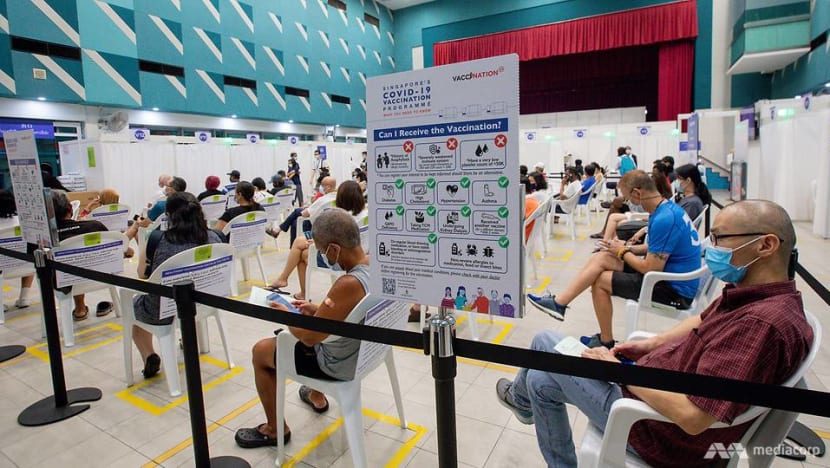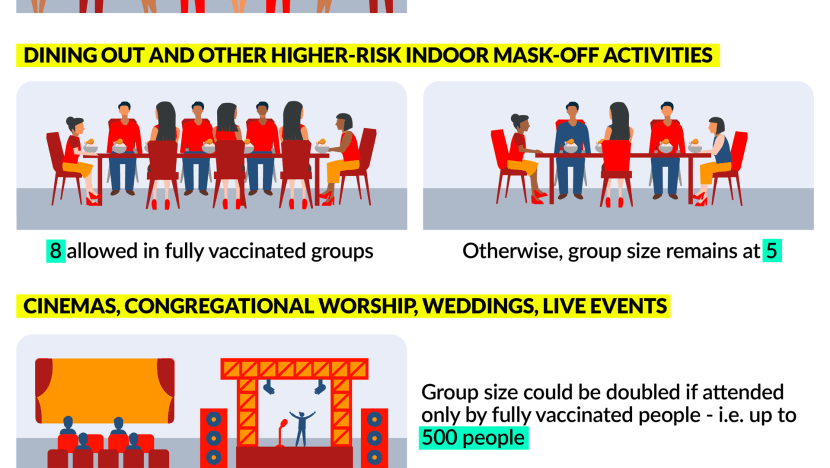People fully vaccinated under national programme may be able to gather in groups of 8 from end-July

COVID-19 vaccination helped prevent tens of millions of potential deaths, researchers have found. (File photo: Ili Nadhirah Mansor/TODAY)
SINGAPORE: Singapore may allow people who are fully vaccinated against COVID-19 to gather in groups of up to eight instead of five, as it considers differentiated measures for those who received the jab under the national vaccination programme.
Such measures may be allowed when Singapore reaches an “important milestone” in its vaccination programme - when 50 per cent of the population has been fully vaccinated, said Minister for Health Ong Ye Kung on Wednesday (Jul 7).
This target is expected to be met around the week of Jul 26, Mr Ong said at a media conference, adding that the current proportion of people who have been fully vaccinated stands at close to 40 per cent.
READ: Groups of five can dine out from Jul 12; work-from-home remains the default
"As Singapore's vaccination coverage continues to increase, we will introduce differentiated safe management measures for vaccinated persons," said the Ministry of Health (MOH) in a separate press release.
"This will allow individuals who have been fully vaccinated under the national vaccination programme to participate in more community and economic activities."
For activities and venues such as cinemas, congregational worship, MICE events and wedding solemnisations, authorities could allow a doubling in the group size - up to 500 people - if they are attended by fully vaccinated people.

READ: Full COVID-19 vaccination provides 69% protection against infection by Delta variant: Singapore study
While work from home remains the default, more people may be allowed to return to the workplace based on a percentage of the total number of employees who are fully vaccinated, said co-chair of the COVID-19 multi-ministry task force Lawrence Wong.
For those who are not fully vaccinated under the national programme, the five-person cap on group sizes will continue to apply.
PROVISIONS FOR CHILDREN, THOSE INELIGIBLE FOR MRNA VACCINES
The differentiated measures will apply to people who have received both doses of the Pfizer-BioNTech/Comirnaty or Moderna vaccine, with an additional two weeks after the second dose for optimal protection.
There may be separate provisions for children aged 12 and below, as well as those who are medically ineligible for the two mRNA vaccines under the national programme.
"We are considering separate provisions for this group,” said MOH, adding that this may include the need for a pre-event test.
"It may well be that some of them may have to go for pre-event tests before they can participate in that group of eight or in that larger gathering, or we may very well allow some exemptions for children by up to a cap," said Mr Wong.
"From a public health basis, we know the assessment is that for children, the risk of severe illness is much lower."
Mr Wong said that the authorities will work out some detailed guidelines around this. Further details on the differentiated measures will be announced closer to the implementation date, said MOH.
READ: Sale of DIY COVID-19 test kits to be extended to supermarkets and convenience stores; no more purchase limits
Noting that the vaccine efficacy against the Delta variant of the virus is better with two doses instead of one - 79 per cent as opposed to 35 per cent in a UK study – Mr Ong urged people to get their second dose earlier. He added that Singapore is not constrained by supply.
Currently, two-thirds of the population has received the first dose of the vaccine.
MORE SENIORS NEED TO BE VACCINATED
Mr Ong gave a breakdown, based on age group, of the proportion of people who have received their first dose or have booked an appointment.
For all eligible age groups, the figure was 80 per cent or more, with the exception of seniors above the age of 70. In this age bracket, the proportion was 71 per cent.
“What we really need to do is to get more of our seniors vaccinated. You compare across the ages, those above 70 have the lowest first dose and booking rates, it really should be the other way around," said Mr Ong.
"We really ought to have them have the highest percentage. We all know they are most vulnerable."
READ: Sinovac vaccine recipients excluded from national tally because 'little data' on efficacy against new COVID-19 variants
The other vaccine being administered here, Sinovac, does not fall under the national vaccination programme. It also does not count towards the national vaccination rate.
This is because little data is available on Sinovac's efficacy against the Delta variant, said MOH's director of medical services Kenneth Mak.
“(For) the mRNA vaccine, there's a little bit more data available at this point in time concerning the vaccine efficacy against the Delta variant. This is partly the reason why we've chosen, in our milestones, to rely on the more tested vaccines,” said Associate Professor Mak.
Watch the full conference and the following Q&A session with journalists:
BOOKMARK THIS: Our comprehensive coverage of the COVID-19 pandemic and its developments
Download our app or subscribe to our Telegram channel for the latest updates on the coronavirus outbreak: https://cna.asia/telegram












